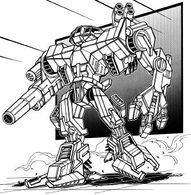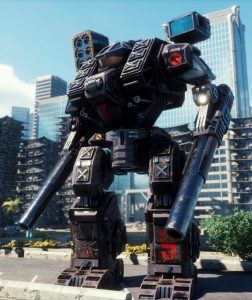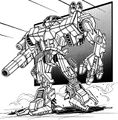Phoenix (BattleMech)

| |
| Phoenix | |
|---|---|
| Production information | |
| Manufacturer | Krauss-Liemann Incorporated[1]
|
| Production Year | 2520[3][4] |
| Model | PX-3R[1] |
| Class | Medium |
| Cost | 4,234,250 C-bills[3] |
| Technical specifications | |
| 'Mech type | Inner Sphere BattleMech |
| Mass | 50 tons |
| Chassis | 12b Krauss-Liemann |
| Armor | PanzerSlab Type 3[1] |
| Engine | Magna 250[1] |
| Communications System | Vex/Holden TriComm Plus |
| Targeting Tracking System | Dillon QuadTrac with Particle Cannon Suite[1] |
| Heat Sinks | 14 single[1] |
| Speed | 86.4[1] km/h |
| Jump Jets | Gerard Special A[1] |
| Armament | |
| BV (1.0) | N/A |
| BV (2.0) | 1,106[1][3][5][6] |
Contents
Description
The Phoenix was the Rim Worlds Republic's first effort to design a jump-capable BattleMech designed and produced by Krauss-Liemann Incorporated. Terens Amaris was convinced that the Wasp and its jump jets heralded a sea-change in tactics and was determined to build a 'Mech larger than the Wasp that incorporated them. Unfortunately, the Republic lacked jump jets, so the project stalled while technicians reverse engineered the technology. Terens insisted on "quality over quantity" in the Republic's BattleMech program, delaying production until well after the Terran Hegemony had fielded the Griffin and Shadow Hawk. The First Consul diverted resources away from other production efforts to accomplish this which became a massive boondoggle. Nonetheless, the Phoenix and its jumping capability did allow the Republic to execute new battle plans, including combat drops from DropShips. No other power produced or salvaged the Phoenix and it was believed to have become extinct following Aleksandr Kerensky's conquest of the Rim Worlds Republic. It was surprising, then, when a ComStar report indicated that the Hanseatic League was deploying a number of them.[1]
The earliest prototypes of the Phoenix underwent numerous changes throughout its long development history. Having nearly reached completion of a prototype in 2470, Terens Amaris ordered the design team to implement jump jet technology for immediate testing - information that had been acquired by the Republic's intelligence agency. They quickly scrambled to redesign a machine that was essentially complete as a result. The design philosophy had been intended to create a front-line trooper BattleMech that would engage enemies at all ranges and so had mounted a PPC and two SRM-4 launchers. In order to reconfigure it as jump-capable, the launchers were downgraded to twin SRM-2s, but received slightly better armor protection. Ultimately Krauss' engineers encountered the same problems as the Terran Hegemony with their earlier Wasp and it took an additional four years until the redesigned prototype was unveiled and another six before it was production ready. It was mired by constant problems including electronics interference when the particle cannon was fired, with pilots giving it the name "Sparkly Bird." The legs were also too weak to deal with the stress of landing a 50 ton BattleMech, resulting in fractured or shattered leg and torso structural components. These were eventually corrected after 33 years, just 13 years before Krauss-Liemann Incorporated designed the modern PX-3R Phoenix. [7]
Weapons and Equipment
The main feature of the medium Phoenix is its ability to jump up to 150 meters thanks to five Gerard Special A jump jets. While grounded, it is capable of attaining 86.4 km/h thanks to a Magna 250 fusion engine, and is protected by nine tons of PanzerSlab Type 3 standard armor.[1]
Primarily a sniper, the Phoenix mounts a Stolz Harbinger 2 PPC. To back it up, the 3R carries a pair of Marklin Mini SRM-2 launchers. Two ammo bins enable the use of different munitions, including inferno missiless.[1]
Variants
- PX-1KC
- Wechsel Royal Industrial Repair and Heavy Machining Incorporated on Kaumberg has created four variants of the retrotech Phoenix. The PX-1KC replaces the PPC and two single heat sinks with an AC/5 and one ton of ammunition.[10] BV (2.0) = 766[11]
- PX-1KL
- The second WRI, Inc. Phoenix configuration replaces the PPC, two single heat sinks, and the SRM-2s of the original for a single large laser supported by an SRM-6 and two tons of ammo.[10] BV (2.0) = 930[12]
- PX-1KR
- The third WRI, Inc. Phoenix configuration replaces the PPC and two single heat sinks with a heavy rifle and two tons of ammunition. The loss of the 'Mech's jump jets for the heavy, inefficient weapon and an extra half ton of armor makes it unpopular with pilots.[10] BV (2.0) = 760[13]
- PX-1KT
- The final WRI, Inc. Phoenix configuration may be the best. The PPC is traded for a Thunderbolt 10 missile launcher with two tons of ammunition. This lets the Phoenix hit with as much damage as the original, but with much less waste heat.[10] BV (2.0) = 857[14]
Design Quirks
The PX-1R Phoenix variant is subject to the following Design Quirks:[7]
The PX-3R Phoenix is subject to the following Design Quirks:[18]
Gallery
Original Phoenix from TRO:3075
References
- ↑ 1.00 1.01 1.02 1.03 1.04 1.05 1.06 1.07 1.08 1.09 1.10 1.11 1.12 1.13 1.14 1.15 Technical Readout: 3075, pp. 298-299, "PX-3R Phoenix"
- ↑ Field Report 2765: Periphery, p. 11, "Infrastructural Integrity"
- ↑ 3.0 3.1 3.2 MUL online entry for the Phoenix (BattleMech)
- ↑ Era Digest: Age of War, p. 11
- ↑ Record Sheets: 3075 Unabridged, p. 272
- ↑ Record Sheets: 3075 Unabridged - Age of War, p. 217
- ↑ 7.0 7.1 7.2 Experimental Technical Readout: Primitives, Volume 5, p. 4 "PX-1R Phoenix 'Mech Profile"
- ↑ 8.0 8.1 MUL online entry for the PX-1R Phoenix variant
- ↑ Record Sheets: 3075 Unabridged, p. 273
- ↑ 10.0 10.1 10.2 10.3 Touring the Stars: Kaumberg, p. 13
- ↑ Touring the Stars: Kaumberg, p. 17
- ↑ Touring the Stars: Kaumberg, p. 18
- ↑ Touring the Stars: Kaumberg, p. 19
- ↑ Touring the Stars: Kaumberg, p. 20
- ↑ 15.0 15.1 MUL online entry for the PX-4R Phoenix varinat
- ↑ Record Sheets: 3075 Unabridged, p. 274
- ↑ Record Sheets: 3075 Unabridged - Age of War, p. 218
- ↑ BattleMech Manual, p. 94 BattleMech Quirk Table - Phoenix Entry.



